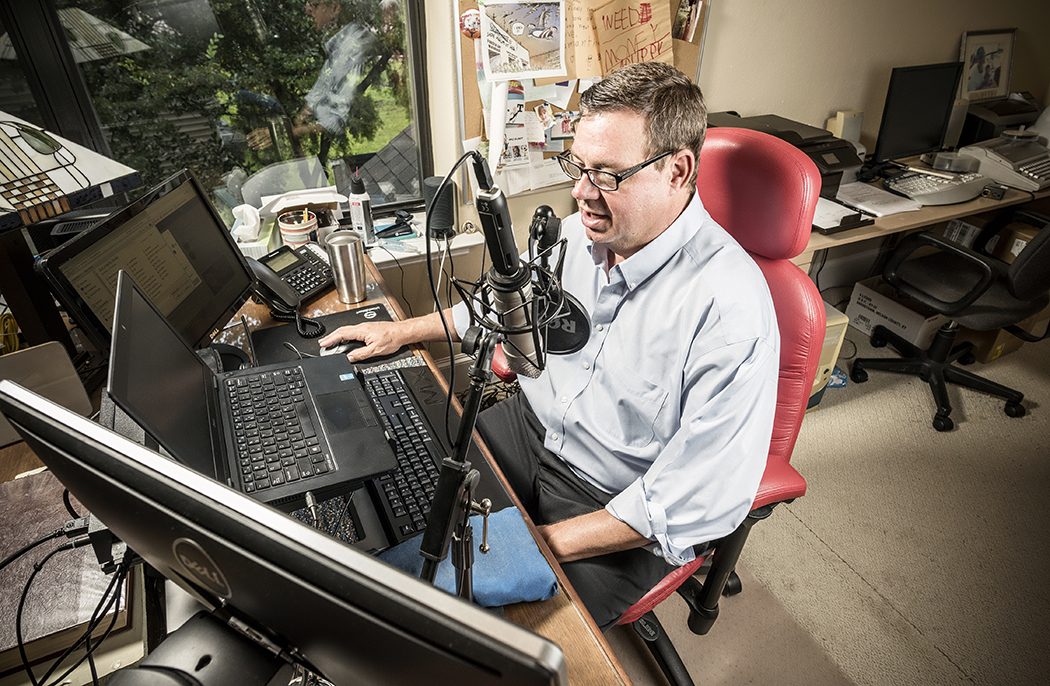
Wade Goodwyn wrote and recorded his NPR stories from his home studio in Forest Hills. (2016 photo by Danny Fulgencio for the Advocate)
NPR correspondent Wade Goodwyn, who lived — and often worked out of his house — in the Forest Hills area of East Dallas, died last week as a result of cancer at age 63.
Goodwyn reported on the Oklahoma City bombing, school shootings, hurricanes, the American Sniper murder trial, the Boy Scouts sexual abuse scandal and ebola as well as the ambush killings of Dallas police officers in 2016 and about a Dallas street choir composed of homeless singers performing at Carnegie Hall.
He told the Advocate in 2016 about his big break while covering a tragic development. During the Branch Davidian siege in Waco, media were denied any access to the Davidian ranch, but a young Goodwyn found out where some released hostages were staying and, well, before long, he said, “I had gotten something no one else had.”
He reported while riding a camel and balancing a microphone through the Big Bend in far West Texas. His story of a single mom who was falsely accused in a drug sweep inspired the movie American Violet.
Goodwyn, son of “social-justice legend” Lawrence Goodwyn, attended University of Texas, started as a theater major before switching to history, and later moved to New York to be a political organizer.
In Texas he organized campaigns for Congressman Lloyd Doggett and later Ralph Nader. In New York he worked with 50+ multi-ethnic interdenominational churches to help them advocate for better municipal services. “I helped them learn how to use the power of the collective churches to hold the politicians accountable and to push back against organized money,” he told the Advocate in 2016.
Goodwyn’s career change was a result of listening to NPR on his commute, according to a 2016 profile in Current.
He told the Advocate he talked his way into meetings with network elites. Though he had zero broadcasting experience when NPR hired him, his background in politics helped him understand things, he said. He could see relationships, imbalances and dynamics. “If you understand how power works, you understand a lot,” he said.
Goodwyn became known for his warm baritone voice, the stories he told and the lyrical way he told them.
“It all started with that voice – a mellifluous bass smoked in barbecue sauce and finished in honey,” his friend and former coworker, Rick Holter — also KERA’s longtime vice president of news — recalled for Monday’s Texas Standard. “It’s a voice that defined Texas for NPR listeners across the country and the globe.”
Goodwyn and Holter, an Oak Cliff resident, played a lot of golf at Tenison and Stevens parks.
“See, Wade loved golf almost as much as he loved Duke basketball and UT football,” Holter said on this morning’s program. “There was something about the pace of it — four hours away from everything, usually broiling in the Texas sun — that clarified things for him, for both of us.
On NPR, the station’s senior editor Steve Drummond called Wade “a poet.”
“The little detail, the little color or sound that he’d seen out in the field, and it just made what he said sparkle.”
In the political realm, his many profiles over the years included George W. and Laura Bush, Rick Perry, Ted Cruz, Dick Cheney and Beto O’Rourke. He covered the rise of the Tea Party, the Enron financial scandal and trial and the wisdom and wit of Molly Ivins.
Some of his most rewarding work was breaking news, and, according to Vickie Walton-James, a managing editor at NPR, “he was really good at infusing humanity into those situations that sometimes people just want to turn away from.”
Wade Goodwyn “lifted voices that sometimes get lost in the media landscape, leaving a lasting impression for many listeners,” said NPR’s Debbie Elliott on All Things Considered.
“He gave voice to much joy, and also much trauma,” she added.
“My god, the stories that man could tell,” his friend Holter said.
The thing you didn’t hear on the radio, his friend says, “was that beneath all that Lone Star bravado Wade was, well, a softie. He couldn’t resist an underdog, and he would dig and dig and dig until he brought their stories to light.”
Goodwyn, who retired from NPR in April, is survived by his wife Sharon and two daughters, Hannah and Sam, a host of family, friends, colleagues all over the country and listeners around the world.
“Wade’s departure will leave holes in a lot of lives,” Holter said. “And a lot of golf courses too.”





